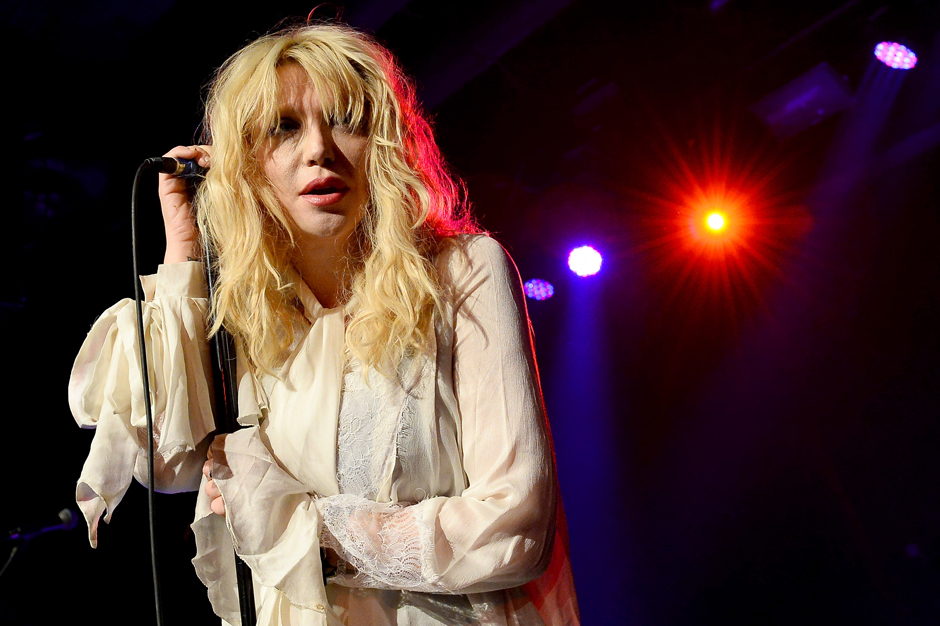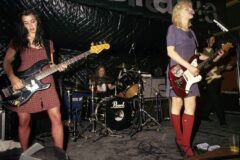“I’m not a forensic analyst, although by now I could be,” said Courtney Love Cobain while seated on the witness stand for the first day of her defamation trial in Los Angeles today.
Love, the first witness to be called in the trial, was being questioned by attorney Barry Langberg, counsel for the singer’s former lawyer, Rhonda Holmes. Holmes sued Love in May 2011 over a tweet from the account @CourtneyLoveUK: “@noozjunkie I was fucking devastated when Rhonda J Holmes Esq of san diego was bought off @fairnewsspears perhaps you can get a quote.”
At the time, Love had retained Holmes and her San Diego firm, Gordon & Holmes, to pursue a fraud case against the executors of her late husband Kurt Cobain’s estate.
In its suit, Gordon & Holmes claims that Love defamed it online after it stipulated that the singer “remain clean and sober” while it represented her case. Yet according to the complaint, “There was never any indication Love honored this condition,” which allegedly “caused Love to become angry with plaintiffs.”
While a number of Twitter-related libel cases have been filed in the past few years – including one in 2009 involving Love that was settled out of court – none before have gone to trial.
In court today, Love maintained that she had meant to send the tweet as a Direct Message to two “wannabe reporters,” Carmella Kelly and Ed “something.” Love said she could not recall the specifics, but that she was responding to Kelly’s question about whether or not lawyers were bought off.
Last month, Love claimed that her tweet was not defamatory because, in the context of the Internet, it represents an opinion. However, Judge Michael Johnson did not agree and sent the case to trial.
When Langberg asked Love if she knew that Kelly had been in contact with NBC, Love said, “That is news to me. I had talked to a legal analyst at NBC myself. I don’t trust Carmela so much and I did not know she was talking to them. It sometimes seems like she’s on the right side and sometimes she’s on the wrong side, and she’s a real conspiracy theorist.”
When asked if she was surprised that more people saw a tweet that was intended to be private, Love replied, “Now that I know it wasn’t private, no.”
Just before time ran out for the day, Langberg finished his questioning by asking Love whether she cared if Holmes saw her tweet. Love answered, “Yeah. Sure.”
Love wore a plaid blazer, a blue one-piece belted dress, earrings, a necklace, bracelets and what appeared to be two diamond rings. Her blond hair was partially tied back into braids. Her makeup was light, apart from coral-colored lipstick. Red-framed glasses sat on top of her head.
Holmes, dressed in a grey suit, also was present in court.
The day got underway with a questioning of alternates after a juror dropped out of the case. One ultimately-dismissed prospective juror called the lawsuit “stupid” and asked, “What happened to freedom of speech?” Another, when Johnson asked if any of the jurors had heard of Courtney Love or Kurt Cobain, replied, “Unless you’re living under a rock, you know these names.” Though some jurors admitted to being fans of Love’s music and/or acting, they said they could remain impartial when serving on a jury.
Each side took approximately an hour to present opening statements. Holmes’ attorney, Barry Langberg, spoke at length of the potential damage Twitter can cause. “Once this kind of charge is made on the Internet, you never know who read it. You never know where it went. Just because you don’t have a list of everyone who saw it doesn’t mean it’s not a problem. You never know where it’s sitting as a ticking time bomb waiting to come out.”
Langberg described Love as a person who knows how to exploit publicity. “You are going to learn that Ms. Cobain knows about publicity, how to generate it, how to use it — she’s involved in it all of the time and this is another example of publicity that she wanted.”
Describing Holmes as a “very well respected trial lawyer,” Langberg conceded that she “was very emotionally involved in the case and really wanted to help her client — maybe too much for her own good.” He added that Holmes “was devastated when she was terminated,” disputing Love’s claims that Holmes “vanished.”
“Rhonda did not vanish,” he maintained. “Ms. Cobain had no basis and there is no evidence to conclude Rhonda Holmes was bought off, and yet [Love] acted recklessly and willfully to destroy the reputation of Holmes.”
Love’s lawyer, John Lawrence, described Love as a “very passionate, emotional and committed artist” in his opening statements. He described her years of struggle, both personal and financial, after Kurt Cobain’s 1994 suicide. He described Love as having been “victimized by many people for many years for millions of dollars” and said that she had rejoiced when she connected with Holmes, who had also lost a husband to suicide.
“In Ms. Holmes, she believed she found a champion. Ultimately, to her great dismay, she found out differently, was left alone and bereft in her quest for justice. Who is the victim? Was it the plaintiff or was it really Ms. Cobain?”
Lawrence described the relationship between Love and Holmes as one that evolved into a close friendship that transcended their business relationship. He said the pair even sometimes shared their wardrobe.
In his depiction of Holmes, Lawrence read aloud from an email that Holmes had written to the lawyer who introduced her to Love. “I am honored and grateful for the opportunity to go after those who wronged your client. I thoroughly enjoy terrorizing bad guys. There is nothing I enjoy more in life than going after people who prey on the vulnerable.”
Referring to the tweet at the center of the lawsuit, Lawrence told the jury that before the lawsuit, no one knew about it or cared, and that the suit is a “quest for money.”
“Were it not for this case, those words would be nowhere and could not be found. It was thrown out to the world to see by Ms. Holmes herself. Curious.”
By the time Love took the stand at 3:19 p.m., the day’s court session was nearly over. While Langberg cross-examined her, Love said she had hired Holmes primarily for the benefit of daughter Frances Bean Cobain. She insisted she had never terminated her relationship with Holmes. “At some point, I knew she was gone.”
When Langberg reminded Love that 80 boxes of documents she had delivered to Holmes’ offices were retrieved before a complaint was ever filed, the singer said she did not know anything about their retrieval. “To this day, I don’t understand why or how the boxes were picked up. I have no recollection of authorizing the boxes to be picked up.”
The trial, originally scheduled to finish up by the end of next week, is expected to continue for at least a few days beyond that.





